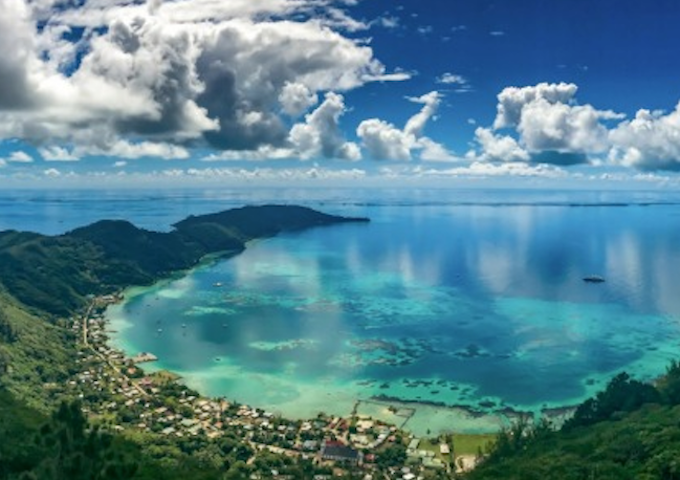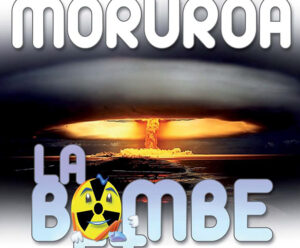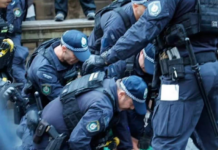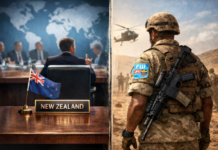
The new French High Commissioner to French Polynesia has heard calls for support and compensation for atolls close to the test sites of France’s nuclear weapons tests.
High Commissioner Eric Spitz has been on his first tour of the outer islands since arriving from France last month to discuss France’s efforts to overcome the test legacy in line with an undertaking of President Emmanuel Macron to “turn the page” over the tests.
Spitz has been visiting Mangareva and Tureia, which are among the inhabited atolls closest to the former test sites of Moruroa and Fangataufa, used for more than 190 tests between 1966 and 1996.
- READ MORE: France ‘must pay’ for study on genetic impact of its Pacific nuclear tests
- Macron to host French nuclear test legacy talks
- Moruroa nuclear site could collapse, MP warns UN
- France asked to pay for Tahiti nuke victims
- Other French nuclear testing legacy reports
The High Commissioner is travelling with the project manager for the French prime minister on the consequences of nuclear tests, Michel Marquer, and the head physician of the monitoring Department of the Nuclear Test Centres of the General Defence Directorate, Dr Marie-Pascale Petit.
The government delegation has been updating the atolls’ residents on the latest findings about residual radiation and the risks emanating from the test sites, weakened by dozens of underground detonations.

The mayor of Tureia, Tevahine Brander, said she would like to have support from France because some locals had given their lives for France while it was developing its nuclear deterrent.
“Perhaps the French state has taken a big step today on the nuclear issue, but my people will always remain vigilant on this subject. Our elders have endured a lot of suffering,” she said.
The mayor of Rikitea on Mangareva, Vai Gooding. also called for compensation, with locals telling the visitors of ongoing concerns.
‘Victims who have died’
Jerry Gooding, who is with the anti-nuclear organisation Association 193, told Tahiti-infos that “in Rikitea, there are victims who have died, and their children have cancer too, although they were born after the nuclear tests.
“This is why the association is asking for a transgenerational study into the genetic impact of the tests.
“Macron went to ask forgiveness in Algeria but did not ask forgiveness from the Polynesians. He must come and apologise to the Polynesians,” he added.
A resident, Benoit Urarii, said “everyone knows that Hiroshima was catastrophic, and everyone knew that it was dangerous for the population. General De Gaulle was aware and chose Moruroa because there were fewer people.
“But it is close to us, so we are the first victims. The first test in 1966 was catastrophic for us Mangarevans. And we got infected. Nobody can deny that.
“We were not asked for our opinion, and we knew exactly how dangerous nuclear tests were.”
The medical expert Dr Petit said there was cancer before nuclear testing.
‘Cancer not only due to nuclear tests’
“It will exist afterwards, and we all know that cancer is not only due to nuclear tests. Nobody is able to say that this is a cancer due to nuclear testing or not. We do not yet have a marker that will make the difference,” she said.
Concern was also raised about a possible collapse of the test area on Moruroa atoll, but Dr Petit said movements were gradually diminishing, leaving a very low probability of a sliding of a sediment plate.
She said whatever happened, the possible swells were likely to be weaker than what Tureia had already experienced.
Doubt persists as residents point to the complex and expensive technology in use to monitor the area around Moruroa, which is still a military “no-go” zone.
Until 2009, France claimed that its tests were clean and caused no harm, but in 2010, under the stewardship of Defence Minister Herve Morin, a compensation law was passed.
Plans are afoot to build a memorial site in Pape’ete, but a resident in Tureia said it should be on his atoll.
“The centre should be here, it’s more honest. But not a memorial for those who have taken advantage of all these years of nuclear testing to enrich themselves and stuff their bank accounts,” he said.
This article is republished under a community partnership agreement with RNZ.







































